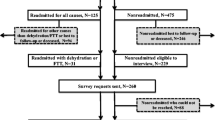Abstract
Early hospital readmission for dehydration represents a relevant problem among patients with diverting or terminal ileostomy. The aim of the study was to evaluate the efficacy of a new multidisciplinary individualized multistep protocol in terms of reduction of hospital readmission for dehydration. Since January 2016, our institution adopted a new protocol for patients with ileostomy. Protocol key points were: preoperative personalized education in stoma management; early recognition of dehydration symptoms; multidisciplinary counseling; patient autonomy in stoma management through post-operative recall schedule. The study compared a series of consecutive patients treated before (2014–2015) and after (2016–2017) the protocol application. The primary endpoint was hospital readmission rate after protocol use. The secondary endpoint was the identification of possible risk factors for readmission. The entire cohort was composed of 296 patients, 129 in the protocol group and 167 in the control one. The two groups were homogeneous for baseline characteristics. Hospital readmission rate within 30 days post-discharge for dehydration dropped from 9 to 3.9% after protocol application. Specifically, the number of avoided potential readmissions was 29/129 (22.4%). The number needed to treat (NNT) was 20. Univariate analysis identified three relevant variables: patient comorbidities, diuretics use as risk factors and protocol application as the protective one. The multivariate analysis confirmed patient comorbidity as the risk factor. Dehydration related to ileostomy is a potentially avoidable problem, by employing preventive strategies, especially in high-risk patients. Our new protocol could be a simple and cost-saving method, effective in preventing hospital readmissions.

Similar content being viewed by others
References
Shabbir J, Britton DC (2010) Stoma complications: a literature review. Colorectal Dis 12(10):958–964
Parma KL, Zammit M, Smith A et al (2011) A prospective audit of early stoma complications in colorectal cancer treatment throughout the greater Manchester and Cheshire colorectal cancer network. Colorectal Dis 13(8):935–938
Hill GL, Mair WS, Goligher JC (1975) Cause and management of high volume output salt-depleting ileostomy. Br J Surg 62:720–726
Gallagher ND, Harrison DD, Skyring AP (1962) Fluid and electrolyte disturbances in patients with long-established ileostomies. Gut 3:219–223
Clarke AM, Chirnside A, Hill GL, Pope G, Stewart MK (1967) Chronic dehydration and sodium depletion in patients with established ileostomies. Lancet 2:740–743
Messaris E, Sehgal R, Deiling S et al (2012) Dehydration is the most common indication for readmission after diverting ileostomy creation. Dis Colon Rectum 55:175–180
Paquette IM, Solan P, Rafferty JF, Ferguson MA, Davis BR (2013) Readmission for dehydration or renal failure after ileostomy creation. Dis Colon Rectum 56:974–979
Hayden DM, Pinzon MC, Francescatti AB et al (2013) Hospital readmission for fluid and electrolyte abnormalities following ileostomy construction: preventable or unpredictable? J Gastrointest Surg 17:298–303
Fish DR, Mancuso CA, Garcia-Aguilar JE, Lee SW, Nash GM, Sonoda T, Carlson ME, Temple LK (2017) Readmission after ileostomy creation: retrospective review of a common and significant event. Ann Surg 265(2):379–387
Nagle D, Pare T, Keenan E, Marcet K, Tizio S, Poylin V (2012) Ileostomy pathway virtually eliminates readmissions for dehydration in new ostomates. Dis Colon Rectum 55:1266–1272
Hardiman KM, Reames CD, McLeod MC (2016) Patients autonomy-centered self are checklist reduces hospital readmissions after ileostomy creation. Surgery 160:1302–1308
Shaffer VO, Owi T, Kumarusamy MA, Sullivan PS, Srinivasan JK, Maithel SK, Staley CA, Sweeney JF, Esper G (2017) Decreasing hospital readmission in ileostomy patients: results of Novel Pilot Program. J Am Coll Surg 224(4):425–430
Florida CV (2001) Dietary choices of peoples with ostomies. Wound, ostomies and continence nurses society 28(1):28–31
Iqbal A, Raza A, Huang E, Goldstein L, Hughes SJ, Tan SA (2017) Cost effectiveness of a novel attempt to reduce readmission after ileostomy creation. JSLS 21(1):1–10
Laganà AS, Vitale SG, Trovato MA, Triolo O et al (2016) Full-thickness excision versus shaving by laparoscopy for intestinal deep infiltrating endometriosis: rationale and potential treatment options. Biomed Res Int 2016:3617179
Dong C, Ngu WS, Wakefield SE (2015) Endometriosis masquerading as Crohn’s disease in a patient with acute small bowel obstruction. BMJ Case Rep. https://doi.org/10.1136/bcr-2014-207229
Vitale SG, Capriglione S, Zito G, Laganà AS et al (2019) Management of endometrial, ovarian and cervical cancer in the elderly: current approach to a challenging condition. Arch Gynecol Obstet 299(2):299–315
Shuurman MS, Kruitwagen RFPM, Portielje JEA, van der Aa MA et al (2018) Treatment and outcome of elderly patients with advanced stage ovarian cancer: a nationwide analysis. Gynecol Oncol 149(2):270–274
Author information
Authors and Affiliations
Corresponding author
Ethics declarations
Conflict of interest
The authors declare that they have no competing interest.
Ethical approval
All procedures performed were in accordance with the ethical standards of the institutional and national research committee and with the 1964 Helsinki Declaration and its later amendments or comparable ethical standards.
Informed consent
Informed consent was obtained by all patients who participated to the study.
Additional information
Publisher's Note
Springer Nature remains neutral with regard to jurisdictional claims in published maps and institutional affiliations.
Rights and permissions
About this article
Cite this article
Gonella, F., Valenti, A., Massucco, P. et al. A novel patient-centered protocol to reduce hospital readmissions for dehydration after ileostomy. Updates Surg 71, 515–521 (2019). https://doi.org/10.1007/s13304-019-00643-2
Received:
Accepted:
Published:
Issue Date:
DOI: https://doi.org/10.1007/s13304-019-00643-2




